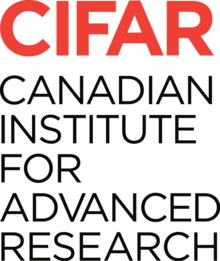Canadian Institute for Advanced Research
 |
|
| Established | 1982 |
|---|---|
| President | Alan Bernstein |
| Chairman | Barbara Stymiest |
| Staff | 37 (2014) |
| Members | 340 researchers and advisors |
| Location | Toronto, Canada |
| Address | 180 Dundas Street West, Suite 1400 |
| Website | www |
The Canadian Institute for Advanced Research (CIFAR) is an institute of advanced study that creates and maintains global research networks working on complex areas of inquiry. It is supported by individuals, foundations and corporations, as well as funding from the Government of Canada and the Provinces of Ontario, British Columbia and Alberta. It was founded in 1982.
CIFAR staff supports the research of nearly 350 researchers, of which about half are located within Canada while the rest are located abroad. The President and CEO is directly responsible to the Chairman and the Board of Directors, who are responsible for funding allocation and approval of research programs. In May 2012, Alan Bernstein became president and CEO.
As of 2014, CIFAR supports research in 11 major multidisciplinary areas:
Archived programs:
CIFAR works with senior academics around the world to identify major new areas of scholarly research where Canada has potential to lead. The institute assembles diverse groups of scholars in its programs, many of whom are established leaders in their fields, and others of who are rising academic stars. The institute invests in the researchers themselves, not in buildings, equipment, or laboratory supplies.
CIFAR supports advanced research by providing program members with such time-freeing benefits as teaching release, funding to hire graduate students and post-doctoral fellows, and general research funding.
The CIFAR research model employs "deep collaboration" at regular program meetings. These meetings exist to bring together researchers from different countries, institutions, disciplines and levels of experience, who might never otherwise meet.
CIFAR was founded by James Fraser Mustard. The first 25 years of its history is covered in the book A Generation of Excellence by Craig Brown.
CIFAR fellows published several papers in 1994 that argued policies driven by population health could address health disparities. They named 10 determinants of health, listing socio-economic status as the most influential. The government adopted the term population health and renamed a branch of the Public Health Agency of Canada "Population and Public Health."
...
Wikipedia
